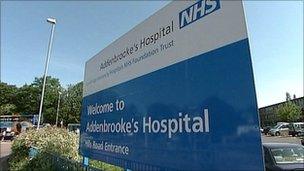Man sues hospital trust over resuscitation policy
- Published

Cambridge University Hospitals NHS trust is responsible for Addenbrooke's Hospital
A man is suing a hospital trust over his claims doctors put "do not resuscitate" orders on his wife's medical notes without her consent.
David Tracey is taking legal action following the alleged use of the orders at Addenbrooke's Hospital in Cambridge.
Janet Tracey, 63, was diagnosed with terminal lung cancer in February. She was later admitted to hospital after breaking her neck in a car accident.
A spokesman for Addenbrooke's Hospital said it disputed the family's account.
But he said it could not comment further because the hospital was subject to ongoing judicial review proceedings.
Mrs Tracey died at the hospital 16 days after breaking her neck.
Mr Tracey claimed doctors cancelled the first "do not resuscitate" order after his wife - who worked as a care home manager - objected to it, only to then put on a second one without her consent or any discussion.
He is taking action against Cambridge University Hospitals NHS trust - which is responsible for Addenbrooke's - and the Department of Health, which he claims have acted unlawfully by not having a standard policy on resuscitation decisions.
'Appropriate'
The spokesman for Addenbrooke's Hospital said: "Our clinicians followed the DNACPR policy, which remains in place."
A Department of Health spokeswoman said: "Decisions on Do Not Attempt Cardio-Pulmonary Resuscitation must be clinically appropriate for the individual involved, weighing up the possible benefits of CPR against any burdens or risks associated with the treatment.
"Because clinical judgment is so important in these decisions, it's our view that guidance provided by a responsible body of professional opinion, based on direct experience of the complexity and sensitivity of these circumstances, is more appropriate than the setting of national guidance by the department.
"There is a substantial amount of expert guidance available to assist those making complex decisions in discussion with other members of the healthcare team, the patient and their family."